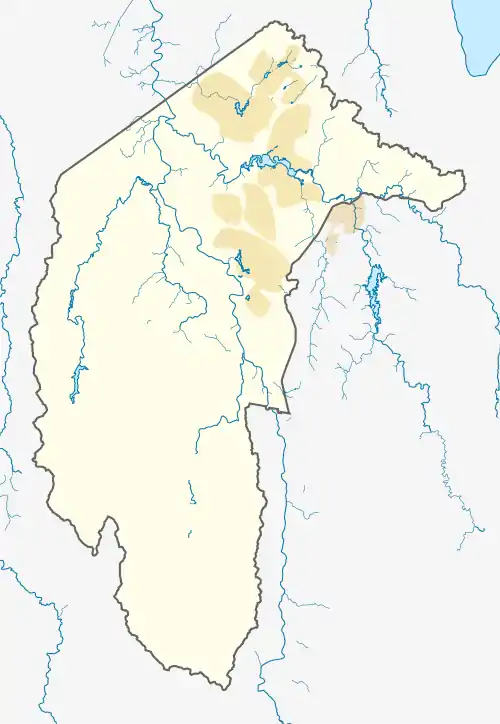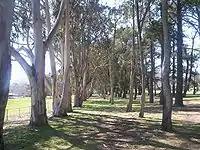Hackett, Australian Capital Territory
Hackett (/hækɪt/) is an inner north suburb of Canberra, the capital city of Australia. Located approximately 4.5 km (2.8 mi) north-east of the central business district, Hackett is adjacent to Watson, Dickson and Ainslie. It is bounded by Antill Street and Philip Avenue, and the Mount Majura Nature Reserve to the east. Hackett has a neighbourhood oval, and shopping centre.
| Hackett Canberra, Australian Capital Territory | |||||||||||||||
|---|---|---|---|---|---|---|---|---|---|---|---|---|---|---|---|
 Hackett sign | |||||||||||||||
 Hackett | |||||||||||||||
| Coordinates | 35°14′53″S 149°09′46″E | ||||||||||||||
| Population | 3,227 (SAL 2021)[1] | ||||||||||||||
| Established | 1960 | ||||||||||||||
| Postcode(s) | 2602 | ||||||||||||||
| Elevation | 609 m (1,998 ft) | ||||||||||||||
| Area | 1.9 km2 (0.7 sq mi) | ||||||||||||||
| Location |
| ||||||||||||||
| District | North Canberra | ||||||||||||||
| Territory electorate(s) | Kurrajong | ||||||||||||||
| Federal division(s) | Canberra | ||||||||||||||
| |||||||||||||||
The suburb was named after Sir John Winthrop Hackett (1848–1916), who was a newspaper editor and worker for the Federation of Australia. Streets in Hackett are named after scientists.[2]

Geology
Calcareous shales from the Canberra Formation is overlain by Quaternary alluvium. This rock is the limestone of the original title of Canberra "Limestone Plains". The higher eastern side of Hackett is on top of the lowest layer of the Ainslie Volcanics, a grey Dacite and other erupted particles such as agglomerate and tuff.[3]
Demography

There were 2,991 usual residents of Hackett enumerated in the 2016 Census.[4]
Hackett is socially and economically advantaged. In 2016, its population was highly educated, with 53% of adults having completed a university degree, compared to just 22% in Australia as a whole.[4] Its unemployment rate was estimated to be just 2.6% in December 2019,[5] just over half the national average of 5.1%.[6] This relative economic prosperity is reflected in median personal incomes which, in the 2016 Census, were reported to be 1.6 times the national average.[4] Overall, the Australian Bureau of Statistics estimate that Hackett is among the top 5% most advantaged suburbs in Australia according to its index of socio-economic advantage and disadvantage.[7]
Hackett is less culturally and linguistically diverse than the rest of the Australian Capital Territory and Australia as a whole. It has an unusually large proportion of the population born in Australia and relatively few residents born in China and India, and a relatively large number of households where English is the only language spoken.[4] In terms of religious diversity, Hackett is unusual in that a majority of residents (53%) report having no religious affiliation, compared with 30% nationally.
Politics
| |||||||||||||||
Hackett is located within the federal division of Canberra, which is currently represented by Alicia Payne in the House of Representatives. The suburb is the home of Andrew Leigh, the Member of Parliament representing the neighbouring electoral division of Fenner.[9]
House of Representatives primary vote statistics are shown to the right for the Dickson East polling place (at Dickson College) in the 2019 federal election.[8] The Dickson East booth, located on the boundary between Hackett and Dickson, returned the strongest vote for the Greens in the House of Representatives of any polling place in the Australian Capital Territory in the 2019 federal election.
In the ACT Legislative Assembly, Hackett falls within the electorate of Kurrajong. Kurrajong is represented by five Members of the Legislative Assembly (MLAs), who are elected using the proportional Hare–Clark electoral system. Currently, it is represented by two Labor, two Greens and one Liberal MLA.[10] Four of these five MLAs are cabinet ministers. The suburb is represented in local matters by the Hackett Community Association, an affiliated member of the North Canberra Community Council.
Particular street names
- Grayson Street is named after scientist Henry Joseph Grayson
- Mackenzie Street is named after anatomist William Colin Mackenzie
- Madigan Street is named after geologist Cecil Thomas Madigan.[11]
- Maitland Street is named after geologist Andrew Gibb Maitland
- Richards Street is named after geologist Henry Caselli Richards
- Rivett Street is named after chemist Albert Cherbury David Rivett.[12]
- Selwyn Street is named after English Australian geologist Alfred R. C. Selwyn
- Skeats Street is named after English Australian geologist Ernest Willington Skeats.[13]
Footnotes
- Australian Bureau of Statistics (28 June 2022). "Hackett (Suburb and Locality)". Australian Census 2021 QuickStats. Retrieved 28 June 2022.
- "Suburb Name search results". ACT Environment and Sustainable Development. Retrieved 9 February 2014.
- Henderson G A M and Matveev G, Geology of Canberra, Queanbeyan and Environs 1:50000 1980.
- "2016 Census QuickStats: Hackett". quickstats.censusdata.abs.gov.au. Retrieved 25 July 2020.
- Department of Education, Skills and Employment-Document library (27 March 2020). "SA2 Data tables - Small Area Labour Markets - December quarter 2019 | Department of Education, Skills and Employment - Document library, Australian Government". docs.employment.gov.au. Retrieved 25 July 2020.
- Statistics, c=AU; o=Commonwealth of Australia; ou=Australian Bureau of (23 January 2020). "Main Features - Main Features". www.abs.gov.au. Retrieved 25 July 2020.
{{cite web}}: CS1 maint: multiple names: authors list (link) - "SEIFA by State Suburb Code (SSC)". stat.data.abs.gov.au. Retrieved 25 July 2020.
- Australian Electoral Commission (11 July 2019). "House of representatives downloads". Retrieved 21 June 2020.
- Colley, Clare (27 May 2016). "Election 2016: meet Andrew Leigh, Labor candidate for Fenner". The Sydney Morning Herald. Retrieved 25 July 2020.
- "Current members". ACT Legislative Assembly. Retrieved 1 March 2021.
- Cecil Thomas Madigan
- Albert Cherbury David Rivett
- Ernest Willington Skeats